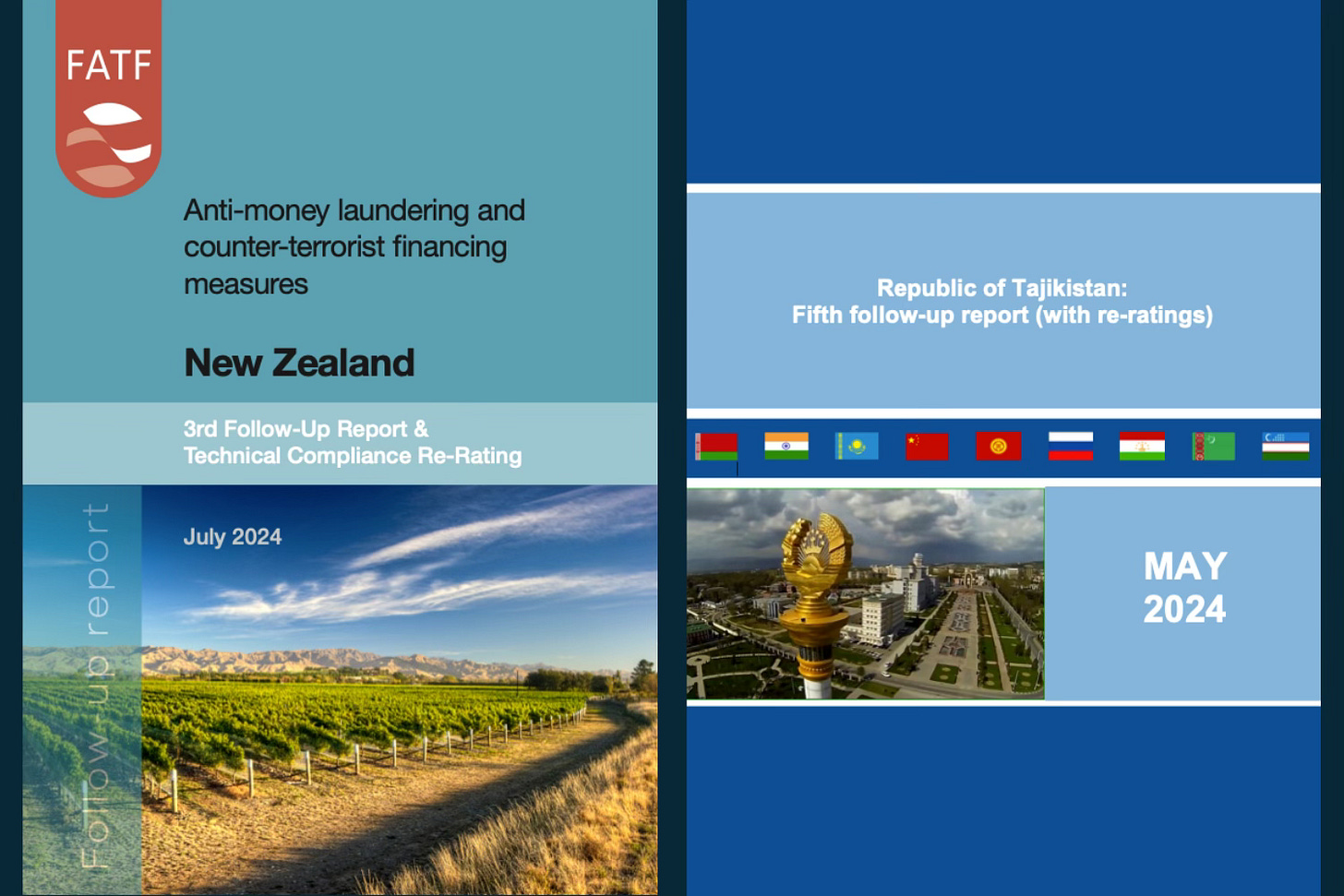The Challenges of KYC and CDD: What You Can Do | The European Banking Authority issued “travel rule” guidance | Revolut obtains UK banking license and more
Welcome to our AML News and Updates Newsletter August 2024 edition. 👏
Stay up to date with main AML news and updates in less than 10 minutes per month!
This newsletter is brought to you by my new KYC and CDD Masterclass!
This 6-hour live-online course will provide you, or your employees, with in-depth knowledge and practical skills to navigate the complexities of AML/CFT… even if they are a complete beginner!
Very few spots available! Register here: https://www.amlcube.com/kyc-and-cdd-masterclass
This newsletter is also brought to you by Capitex and its “Recruit, Train & Deploy” initiative – a 0-cost financial crime compliance staffing solution.
Struggling to find qualified employees? Want to support your compliance department at no cost? Contact James Govey at james@capitex.co.uk. Type "AMLCube" to the subject line, to be eligible for lifetime access for you being a part of my network.
Let's see an outline of the topics to be covered in this edition:
Discussion of the month: The Challenges of KYC and CDD: What You Can Do
Regulatory Developments: FATF Follow-Up Reports published in July 2024 | The European Banking Authority (EBA) issued a “travel rule” guidance | AUSTRAC has published the Money Laundering National Risk Assessment for 2024 and the Terrorist Financing National Risk Assessment for 2024 | The FATF published an update on implementation of the FATF standards in the Virtual Asset (VA) sector
Other News: Cryptocurrency exchange BitMEX pleaded guilty to violating the Bank Secrecy Act (BSA) in the US | The Hong Kong Unit of Singapore’s DBS Group Holdings was fined UK$10 million for violating AML/CFT regulations | CB Payments Limited (CBPL) has been fined £3,503,546 by the Financial Conduct Authority (FCA) | Revolut receives UK banking license.
Let's start...
The Challenges of KYC and CDD: What You Can Do
Know Your Customer (KYC) and Customer Due Diligence (CDD) are terms often used interchangeably. In some countries, they are synonymous, while in others, KYC refers to the initial measures taken to understand the customer, while CDD is a more continuous process.
Regardless of the specific terminology, both concepts underpin the need to identify, verify and understand your client ideally before onboarding. Entities are required to have robust KYC and CDD measures in place to ensure compliance with Anti-Money Laundering (AML) regulations.
However, what challenges do entities face when developing a robust KYC & CDD process?
Let’s explore some of them!
Regulatory Differences
One of the primary challenges for businesses operating in various countries is the diverse regulatory landscapes. Requirements for registration or licensing, identification and verification of customers, and ongoing monitoring can vary widely across jurisdictions, making it difficult for entities to comply with the different requirements.
What you can do: Conduct thorough regulatory research, invest in compliance technology, establish a dedicated compliance team, and consider seeking local expert advice.
Differences in Business Nature
No two businesses are identical, even within the same industry. Risk profiles vary significantly based on factors such as customer type, transaction volume, and geographic location. Tailor-made KYC and CDD procedures are essential to address these challenges effectively. However, developing and maintaining such customized processes can be resource-intensive.
What you can do: Conduct thorough risk assessments, develop flexible KYC workflows, leverage customer segmentation, and utilize advanced analytics.
Demonstrating Compliance to the Regulator
Demonstrating compliance to regulators is a critical aspect of KYC and CDD. Generating accurate and comprehensive reports in response to regulatory inquiries can be time-consuming and complex. Moreover, regulators often introduce new reporting requirements, adding to the compliance burden.
What you can do: Implement robust record-keeping systems, leverage automation for reporting, conduct regular compliance audits, and maintain open communication with regulators.
Data Quality and Management
High-quality customer data is essential for effective KYC and CDD. However, gathering, verifying, and maintaining accurate information can be challenging.
Data privacy regulations, such as GDPR, impose restrictions on data collection and storage, further complicating the process.
What you can do: Invest in data quality tools, implement data validation procedures, adopt data minimization principles,and ensure compliance with privacy regulations.
Customer Experience
While KYC and CDD are essential for mitigating risk, they can also impact the customer experience. Lengthy onboarding processes, excessive documentation requirements, and intrusive verification methods can lead to customer dissatisfaction and termination.
What you can do: Streamline onboarding processes, leverage digital identity verification, provide clear communication, and offer customer support.
Emerging Technologies and Risks
The rapid evolution of technology brings both opportunities and challenges to KYC and CDD. While technological advancements can streamline processes and improve efficiency, they also introduce new risks, such as cybercrime and data breaches.
What you can do: Stay informed about technological advancements, invest in cybersecurity measures, conduct regular risk assessments, and adopt a proactive approach to emerging threats.
Cost and Resource Constraints
Implementing and maintaining a robust KYC and CDD program requires significant investment in technology, personnel, and training. Smaller financial institutions may face particular challenges in allocating sufficient resources to compliance.
What you can do: Prioritize compliance efforts, leverage technology to automate processes, outsource non-core functions, and explore cost-effective compliance solutions.
In conclusion, KYC and CDD are complex and multifaceted processes that present numerous challenges for financial institutions. Addressing these challenges requires a combination of regulatory expertise, technological innovation, and a strong commitment to compliance. By investing in robust KYC and CDD programs, financial institutions can mitigate risks, protect their reputation, and foster customer trust.
Navigating these complexities can be overwhelming.
That's why I've created a 6-hour comprehensive KYC and CDD Masterclass designed to equip you with the knowledge and tools to excel in compliance.
Want you or your employees get a deeper understanding of KYC and CDD best practices?
Enroll in my KYC & CDD Masterclass today! Limited spots available!
FATF’s Follow-Up Reports published in July 2024
The FATF, in July 2024 has published the following Follow-Up Reports:
The European Banking Authority issued “travel rule” guidance
The purpose of the guidance is to specify which information must accompany a transfer of funds or crypto assets and the steps that Payment Service Providers (PSPs), intermediary PSPs, Crypto-Asset Service Providers (CASPs) and intermediary CASPs should take to detect missing or incomplete information.
Money Laundering and Terrorist Financing National Risk Assessment of Australia
AUSTRAC, the Australian regulator for AML/CFT has published:
If you are a paid subscriber read the key findings in our article: Understanding ML/TF Risks in Australia: All you need to know
Updated Implementation of the FATF Standards in the Virtual Asset (VA) sector
The FATF published an updated on implementation of the FATF standards in the Virtual Asset (VA) sector. The report highlights that 75% of the jurisdictions are only partially or not compliant with the FATF’s requirements for VAs, i.e. the Travel Rule. Even for countries implementing the Travel Rule, supervision and enforcement remains low.
BitMEX pleaded guilty for violating BSA
Cryptocurrency exchange BitMEX pleaded guilty to violating the Bank Secrecy Act (BSA) by operating without “any meaningful” AML program from 2015-2020. As a result, the company was used for “large-scale money laundering and sanctions evasion schemes, posing a serious threat to the integrity of the financial system.”
DBS Group Holdings in Hong Kong was fined for violating AML/CFT regulations
The Hong Kong Unit of Singapore's DBS Group Holdings was fined HK$10 million for violating anti-money laundering (AML) and counter-terrorist financing (CFT) regulations. The Hong Kong Monetary Authority (HKMA) found control failures between 2012-2019, including inadequate monitoring of business relationships and customer due diligence.
CB Payments Limited fined in the UK
CB Payments Limited (CBPL) has been fined £3,503,546 by the Financial Conduct Authority (FCA) for repeatedly breaching a requirement that prevented the firm from offering services to high-risk customers. CBPL is part of the Coinbase Group, which operates a prominent cryptoasset trading platform that is accessible globally.
Revolut receives UK banking license
Revolut finally receives UK banking licence after three-year wait. The licence comes with some restrictions but it is a significant milestone for the company, as it will enable Revolut to hold customer deposits, offer own-branded loans and mortgages, and challenge traditional banking giants in the UK.
Want to know why this was necessary? Read my latest post on this for free.
If you are not a paid subscriber of my Substack publication, here are only some of the articles you missed this month:
Inspiring Excellence in Compliance Team: Strategies for Success
Money Laundering with the use of life insurance and trusts - A real-life case study
Want to receive new knowledge daily in your inbox? Consider upgrading to paid for only 19.50 per month!
Found this useful?
Share it with other people to spread awareness!
Have a nice rest of the month!
Regards
Anna Stylianou
Founder AML Cube Consulting and Education












